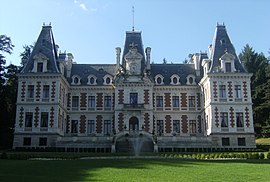Tulle
Tula (Occitan) | |
|---|---|
Prefecture and commune | |
 Prefecture building in Tulle | |
| Motto(s): Sunt rupes virtutis iter (There are rocks on the path to virtue) | |
| Coordinates: 45°16′4″N 1°46′14″E / 45.26778°N 1.77056°E | |
| Country | France |
| Region | Nouvelle-Aquitaine |
| Department | Corrèze |
| Arrondissement | Tulle |
| Canton | Tulle |
| Intercommunality | CA Tulle Agglo |
| Government | |
| • Mayor (2020–2026) | Bernard Combes[1] (PS) |
Area 1 | 24.44 km2 (9.44 sq mi) |
| Population (2021)[2] | 13,992 |
| • Density | 570/km2 (1,500/sq mi) |
| Demonym | Tullistes |
| Time zone | UTC+01:00 (CET) |
| • Summer (DST) | UTC+02:00 (CEST) |
| INSEE/Postal code | 19272 /19000 |
| Elevation | 185–460 m (607–1,509 ft) |
| 1 French Land Register data, which excludes lakes, ponds, glaciers > 1 km2 (0.386 sq mi or 247 acres) and river estuaries. | |
Tulle (French: [tyl] ; Occitan: Tula [ˈtylɔ]) is a commune in central France. It is the third-largest town in the former region of Limousin and is the capital of the department of Corrèze, in the region of Nouvelle-Aquitaine. Tulle is also the episcopal see of the Roman Catholic Diocese of Tulle.
Stretching over more than three kilometres in the narrow and tortuous Corrèze valley, Tulle spreads its old quarters on the hillside overlooking the river, while the Notre-Dame cathedral emerges from the heart of the town. Known sometimes as "the town on seven hills", Tulle rose to prominence through the development of its manufacturing sector.
- ^ "Répertoire national des élus: les maires" (in French). data.gouv.fr, Plateforme ouverte des données publiques françaises. 13 September 2022. Archived from the original on 28 June 2020. Retrieved 24 November 2022.
- ^ "Populations légales 2021" (in French). The National Institute of Statistics and Economic Studies. 28 December 2023.



